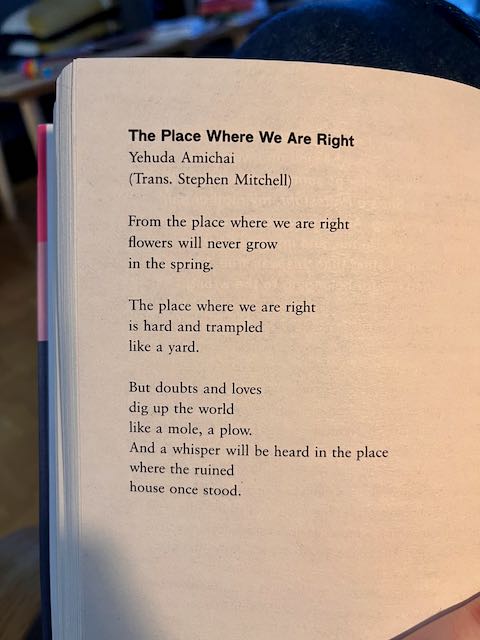Weeknotes are a habit I’m cultivating where I share writing (and some links) as a thinking-in-public process. The idea is to explore ideas I’m grappling with, primarily in my professional life, without worrying about them being full-formed. The potential visibility of these notes is a nudge to develop them a bit more than if they were private. While my audience is mostly theoretical, if you’re reading this, please understand these are meant to be exploratory and provisional.
quotes
“It is easy for me to imagine that the next great division of the world will be between people who wish to live as creatures and people who wish to live as machines.” – Wendel Berry, 2000, Life is a Miracle
thinking about
It’s the end of the academic term, which means many things require reports.
While I am beholden to write reports and sometimes even do them of my own volition, I’m not sure how often they’re read or have any impact, especially if they are required by some process but not by any actual person. I’m reminded of a colleague at a previous job who would joke that our annual performance reviews should take the form of a form filled out by both the employee and their manager that just had a checkbox for “I’m doing okay” and “you’re doing okay” and if everyone agrees everyone is doing okay, that would be the end of the review.
The one beneficial thing these reports could provide, honest assessment and reflection, is often lost by the need to be relentlessly positive, especially if your job or resources for your organization is at stake. Their format, usually formal and narrative, further obscures anything valuable they might contain.
All this makes them one of the things we do that AI is actually pretty good at, and I suspect a lot of us (me included) are using it for summarizing and drafting reports, if not for writing the whole thing. If done poorly, as it usually is, just further removes and obscures what is valuable.
I’d love to just a submit a shorthand “I’m okay, you’re okay” style report for many of these, but I suspect that wouldn’t go over well. But here is my shorthand “I’m okay, you’re okay” END OF THING REPORT for a couple of things I’ve written up recently.
Makerspace End of Term Report
- I spent less time than I wanted in the space with students and staff, but more than last term. I am working on increasing this by getting out of other commitments, but this is taking time.
- It feels a little less busy in the space this year, but I don’t think this is a problem (though we should probably do some formal assessment to find out). There are still a lot of people using the space, and more of those seem to be learning independently and working on intensive projects over longer periods of time. If true, I am not sure if this is due to a change in our users’ behaviour, a change in how we run the space, or both.
- Trained staff who understand the vision and culture of the space remain essential to student success and we are losing two staff members this year, one to a promotion and one to pursue a master’s in library and information science. While it’s wonderful watching colleagues move on to their next thing, it does cause some uncertainty about the future.
- Sustainability and Indigenization connect with many other values that we want to promote, such as equitable access, belonging, community, and critical making. They are multipliers for the rest of our values.
Sustainability Grant
- I was far too ambitious when I wrote this grant. Present Frank always assumes future Frank will have more time than he currently has, which is never true.
- We completed most of the concrete objectives but none of the stretch goals
- Student workers bring energy, connections, perspectives but require a lot of time, probably as much time as doing most tasks yourself. it is still worth it to gain those perspectives and connections and provide mentorship.
- I need to get better at delegating work
Coyote Grant
- We did a lot in a short time, including hosting welcome events for Indigenous Students and sponsoring workshops on feather work, moccasin making, and beading.
- We need to start earlier in the year, probably right away in September, if we expect to collaborate with student clubs on events as we wanted.
- Indigenization is about relationships and community. Everything we do must be part of an ongoing connection.
Department Chair
- There is most likely a joke about to be made along the lines of: “the first rule of being department chair is don’t talk about being department chair”
- There are many problems in the world that are in the category “not big enough to deal with the consequences that will arise when dealing with them” and which are therefore left alone until they become big enough that it’s worth dealing with those consequences.
photos – Iridescent Circle of Clouds
I recently started playing Dungeons and Dragons with a group of friends and I’ve been playing around with using AI to teach me the rules and strategies. It works surprisingly well to give it your character sheet and some background story and then ask it questions over time about rules, spells, etc. It’s also a good way to learn how it’s memory works and when it breaks down.
Last night after we played I used the same chat to generate some images of the character. ChatGPT’s image generation now allows you to ask for specific edits to images and even parts of images. It’s definitely not perfect and to my amusement, no matter how many times I asked it to give me a baseball cap it remained convinced (for training data reasons I suspect) that gnomes wear pointy hats. I love this because this is exactly my partner’s preferred “toque on baseball cap” hat style.

I also asked it to write a bio in the style of a New Yorker profile. It’s not perfect, but this was it’s first draft and it’s pretty good:
“Iridescent Circle of Clouds,” a rock gnome Druid, recently emerged from decades of hermetic solitude in the desert, arrives in the world with a conviction as clear as it is radical: that all existence is conscious, nothing possessing more intrinsic value than anything else. This philosophical outlook, born from long contemplation and the harsh realities of the desert, flavors his every interaction with a curious blend of detachment and profound connection. Despite his austere background, he has cultivated a somewhat incongruous taste for the finer things—silk robes, aged bourbon, the cool draw of a well-crafted pipe—each a reminder of the sensory joys he once eschewed. As he navigates the bustling towns and verdant wilds beyond his sandy confines, “Iridescent” often seems to orbit the edge of solipsism, seeing the universe’s vast complexity as a mirror of his own consciousness. This true neutral character is constantly weaving his personal revelations into conversations, seeking his place in a world he regards as both an extension of self and a boundless mystery to be unraveled.
links
Matt Pearce on Journalism After the Death of Hyperlinks
But I am going to say something that I mean sort seriously but not literally: I don’t really care about copyright! I don’t really care about paywalls! I’m okay with it if you only ever see my reporting via a chatbot! Copyright and paywalls are simply means to an end, and that end is the pursuit of human knowledge and self-liberation: the end is our freedom. And one of the principles of human freedom that I hold dear to my heart is that nobody should be providing labor to massively profitable corporations for free.
Sara Hendren on The City and the Limiting Virtues – This year we formalized our values and pedagogies into a program description and passed that through out faculty council. The main reason I decided to do this was because I think I’ve learned that its as important to know what you aren’t (in our case, we are not a classroom, a lab, or a print shop) as what you are, and this document clarified both. This article reminded me of that.
The library holds a gradation of the limiting virtues: a half-quiet first floor with new books, tables and chairs for afterschool tutoring, and the information desks for everyone — the neighborliness of a public institution’s front door. The second floor features enclosed meeting spaces for groups on a first-come, first serve basis, plus a really really quiet room for patrons wanting the moderation of all notifications off. The entire third floor is devoted to children — a beautiful raucous energy, with activity rooms, cozy nooks, and floor-to-ceiling windows on every side. A teen room in the old structure holds high-backed wing chairs and booths for semi-sedentary socializing, and a maker space occupies much of the basement. Things you can do and things you can’t, by design.
L. M. Sacasas – Vision Con
But what if, as Bennett suggests, the world is already enchanted and the real alchemy that summons the miracle of being is that fusion of time and care that we call attention?


